
Francoist Spain, or the Francoist dictatorship, was the period of Spanish history between 1939 and 1975, when Francisco Franco ruled Spain after the Spanish Civil War with the title Caudillo. After his death in 1975, Spain transitioned into a democracy. During this time period, Spain was officially known as the Spanish State.
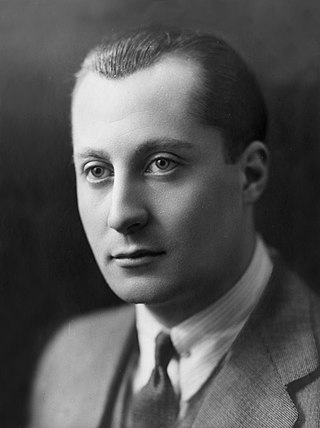
José Antonio Primo de Rivera y Sáenz de Heredia, 1st Duke of Primo de Rivera, 3rd Marquess of Estella GE, often referred to simply as José Antonio, was a Spanish politician who founded the falangist Falange Española, later Falange Española de las JONS.
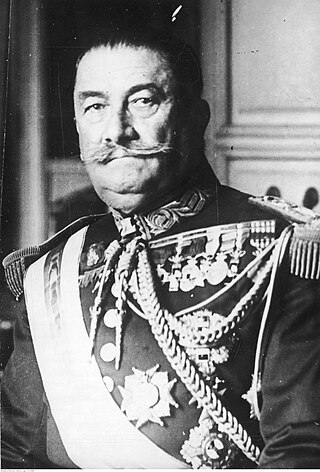
Dámaso Berenguer y Fusté, 1st Count of Xauen was a Spanish general and politician. He served as Prime Minister during the last thirteen months of the reign of Alfonso XIII.
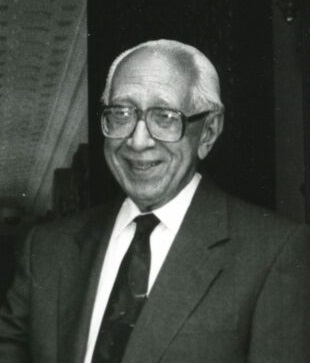
Ramón José Velásquez Mujica was a Venezuelan politician, historian, journalist, and lawyer. He served as the president of Venezuela between 1993 and 1994.

The 1977 Spanish general election was held on Wednesday, 15 June 1977, to elect the Spanish Cortes of the Kingdom of Spain. All 350 seats in the Congress of Deputies were up for election, as well as all 207 seats in the Senate.
The National Social Movement was a minor Bulgarian political party formed in 1932 by Aleksandar Tsankov.
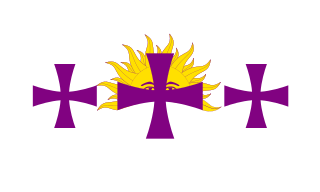
Hispanidad is a Spanish term alluding to the group of people, countries, and communities that share the Spanish language and Hispanic culture. The term can have various, different implications and meanings depending on country of origin, socio-political views, and cultural background.

The Falange Española Tradicionalista y de las Juntas de Ofensiva Nacional Sindicalista, frequently shortened to just "FET", was the sole legal party of the Francoist regime in Spain. It was created by General Francisco Franco in 1937 as a merger of the fascist Falange Española de las JONS with the monarchist neo-absolutist and integralist Catholic Traditionalist Communion belonging to the Carlist movement. In addition to the resemblance of names, the party formally retained most of the platform of FE de las JONS and a similar inner structure. In force until April 1977, it was rebranded as Movimiento Nacional in 1958.
Dr. Carlos Alzugaray Treto is a Cuban diplomat and educator.

Gabriel Arias–Salgado Montalvo was a Spanish politician of Falangist ideology, who held positions during the Franco dictatorship.
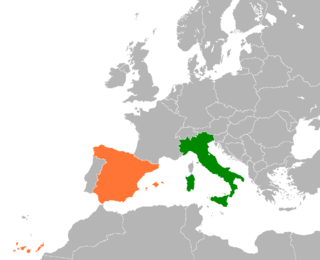
Italy–Spain relations refers to interstate relations between Italy and Spain. Both countries established diplomatic relations some time after the unification of Italy in 1860.

Fascism has a long history in North America, with the earliest movements appearing shortly after the rise of Fascism in Europe. Fascist movements in North America never gained power, unlike their counterparts in Europe.

Maurism was a conservative political movement that bloomed in Spain from 1913 around the political figure of Antonio Maura after a schism in the Conservative Party between idóneos and mauristas ('maurists'). Its development took place in a period of crisis for the dynastic parties of the Spanish Restoration regime. The movement, which fragmented in several factions in the 1920s, has been portrayed as a precursor of the Spanish radical right.

José Solís Ruiz was a Spanish politician, known for his role in Francoist Spain, during which he occupied a number of important posts.
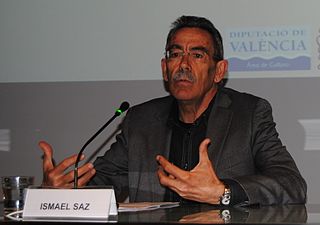
Ismael Saz Campos is a Spanish historian, specialised in the study of Falangism, Francoist Spain and the Spanish-Italian relations during the Spanish Civil War. He is a professor at the University of Valencia.
The history of the far-right in Spain dates back to at least the 1800s and refers to any manifestation of far-right politics in Spain. Individuals and organizations associated with the far-right in Spain often employ reactionary traditionalism, religious fundamentalism, corporate Catholicism, and fascism in their ideological practice. In the case of Spain, according to historian Pedro Carlos González Cuevas, the predominance of Catholicism played an essential role in the suppression of external political innovations such as Social Darwinism, positivism, and vitalism in Spanish far-right politics.
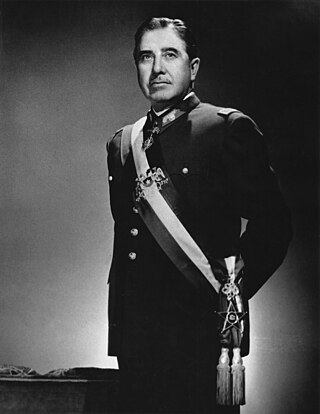
Pinochetism is an authoritarian and personalistic political ideology rooted in the military dictatorship led in Chile between 1973 and 1990 by Augusto Pinochet. Variously described as right-wing, far-right, and semi-fascist, Pinochetism is characterised by its anti-communism, conservatism, militarism, and nationalism. Under Pinochet, Chile's economy was placed under the control of a group of Chilean economists known collectively as the Chicago Boys, whose liberalising policies have been described by some as neoliberal. Formers and current supporters of the dictatorship are known as pinochetistas.
The National Assembly sometimes also referred to in Spanish as Asamblea Nacional Consultiva was a corporative chamber in Spain created by the dictatorship of Primo de Rivera, charged with the task of drafting a new constitution. It was active from 1927 to 1929.

Together for Peru is a Peruvian centre-left to left-wing political coalition founded with the incumbent registration of the Peruvian Humanist Party.
The Army of the North of Peru or Restoration Army of Peru was the army of the Northern Peruvian Republic that was made up of Peruvians opposed to the establishment of the Peru-Bolivian Confederation, who accused Bolivian President Andrés de Santa Cruz of having invaded and divided Peru with the support of Peruvian President Luis José de Orbegoso whom his opponents did not recognize as legitimate. It later merged with the Chilean Army to form the United Restoration Army. The goal of the army was to restore the united Peruvian state prior to the establishment of the Confederation.














